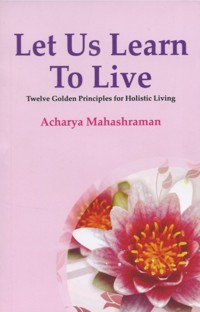It is healthful to be calm when eating and chew properly, emotional stress and the turmoil induced by anger, greed, jealousy, fear and the like impair digestion.
Food is an essential requisite of life. It provides the energy to sustain physical existence. Everyone eats but not many comprehend the right way to eat. There are three important aspects of proper eating:
- Controlled and restrained food intake
- Wholesome and nutritious diet
- Food obtained by honest and socially acceptable means
Controlled Diet and Restrained Food Intake
The type and amount of food consumed by each person varies. Some eat to meet the basic necessities of the body whereas others may have voracious appetites, far exceeding and ignoring even the sensors of satiety. According to the common concepts of digestion, it is healthier to eat at least two morsels less than what hunger demands. For instance, if one has the appetite for two chapattis (a type of bread), it is advisable to just eat one and a half. To eat more is an unwelcome invitation to poor health. Unfortunately, despite awareness that certain foods lead to ailments, it is not uncommon for people to eat them and also to overeat. When rich food is served the tongue enjoys it but the stomach often suffers. One should allow the tongue to rest for three to four hours after a meal so that the digestive system can carry out its normal function unimpeded. The Jain tradition of periodically abstaining from food and even water for a specified duration constitutes penance. A controlled diet thus has dual benefits: practicing restraint and maintaining good health.
During my childhood visits to the monks, I once met an elderly person who showed me a booklet entitled "How to Get Liberation While Eating and Drinking". One of its pages was divided into squares with the following instructions for the practitioner who renounces food: When abstaining from food for an hour, he should mark a square with a dot, and this marking should be continued for each additional hour of fasting, until the page is filled. The purpose of this exercise is to keep track of one's progress in the practice of self-restraint.
The following anecdote, translated from Sanskrit, illustrates the pitfalls of excessive eating:
Once a young boy who had just finished a full meal received an invitation from his friend to eat dinner with him. The youth was tempted by the prospect of delicious food, but decided to ask his father before accepting the invitation.
He asked through a Sanskrit Couplet:
"Urdhvam gachchhanti nodgarah, nadbo gacbchhanti vayavah. Nimantranam samayatam, tata! bruhi karomi kim?""Dear father!" he said, "I had a good lunch and I am too full to eat any more. But I have an invitation for another meal and I am tempted. Please tell me what I should do."
The father thought it might not serve any useful purpose to directly discourage his son from attending the party. Instead he found another way. He said:
"Bhojanam kuru durbuddhe!, ma praneshu dayam kuru. Parannam durlabham loke, sharirani punah punah."
"Dear son! What is there to ask? Eat as much as you want! What can happen other than bodily harm! You may become ill, you may even die. Even if you die, you will be able to get another body in the next life, but you may not get another invitation for such a feast!"
The son quickly understood the message of the adverse effects of overeating. The father's subtle words were more effective than if he had simply forbidden his son not to eat right after a full meal, no matter how tempting the occasion.
There are several ways to control food intake, ranging from complete fasting to limiting quantity or quality. After a certain age, one should minimize the evening meal or even completely forgo it. A devotee once came to me and said, "I routinely don't eat at night, but sometimes when I travel I am compelled to do so. What should I do?" I replied that at his age, two meals a day were enough. Not to eat in the evening is healthy, with physical as well as spiritual benefits.
Some people practice Ekasana (eating once a day). However, if they try to make up for what they would be missing by excessive eating in one sitting, this can create problems. Neither breakfast nor any other meal should be heavy. People also tend to eat more at Parna (the meal after a fast) than they normally would. Speaking from experience, Gurudev Tulsi says that eating excessively after Parna might upset the stomach and create heaviness in the legs. Avoiding solid food and drinking some milk during Parna is healthful and soothing. A controlled Parna is essential. If a person fasts for eight days or fifteen days or even an entire month but fails to control his intake at Parna, he puts his health at risk even if the food is wholesome.
Besides controlling the amount of food you should also control the speed at which you eat. Eating in haste is deleterious. The digestive system becomes overworked when food is swallowed without thorough chewing. Since digestion starts from the mouth and not in the stomach, it is important to chew properly. Equally essential is the need to keep the mind calm and free of anger, greed, jealousy, and fear. Emotional stress can impair digestion. Right and restrained food intake boosts the production of energy.
Eating Nutritious and Wholesome Food
Wholesome food is obviously good for health. However, what is wholesome for one person might not be right for the other. Not all foods are suitable for or tolerated by everyone. The Jain scripture Uttaradhyayana tells the story of a king who lost his life precisely because he ate forbidden food:
A king, who was very fond of mangoes, ate a large quantity of them every day and that eventually made him ill. He was prescribed medication and was prohibited from eating mangoes. Soon his regained his health. To avoid temptation he ordered all the mango trees in his kingdom be uprooted.
A few weeks later, the king went for a ride with his minister. They wandered far off his kingdom and entered a grove of mango trees. Captivated by the fragrance, the king expressed his desire to rest there. The minister politely reminded him that he was supposed to stay away from mangoes, warning him it would be risky to linger there. But the king insisted and the minister had to give in to his master.
While the king was resting under a mango tree, a gust of wind blew a mango down into his lap. The king picked it up and looked at it. The minister begged him to throw it away but the king argued, "What harm is there in simply looking at a mango? After all, the doctor only forbade me from eating mangoes, and not from enjoying their beauty and aroma." As the King glanced at the mango, his temptation grew and he brought it closer to his nose to sniff the enticing fragrance. The minister again protested, but the king repeated his argument.
Then the king couldn't resist his craving for the fruit. But sucking on the mango was like ingesting a poison. Although the minister rushed the king back to the palace, his condition worsened. The royal physician made a dire diagnosis. The king was in a serious condition on account of the mango he had eaten. The king protested, "I didn't eat much. I only sucked a little juice." "Your Majesty!" said the doctor, "Even that little bit has done irreparable harm to you and unfortunately, we are now helpless!"
The king exhaled his last breath even as the doctor was speaking. The king could have avoided death if he had only exerted self-control. But he gave in to temptation. The mango by itself is not unhealthy for most people, but for the king it certainly was! The definition of "wholesome" food varies from person to person and is determined by physiology and body makeup.
Eating Food Obtained through Honest and Socially Acceptable Means
Eating food obtained through legitimate efforts brings gratification and serenity and thus promotes good health. Such food is digested easily and generates positive energy. Food procured via dishonest means and by defrauding others can instill a sense of guilt and thereby corrode one's energy at the physical as well as mental level.
Unlike monks lay people cannot exist without possessions. Nor can they resort to begging to supply themselves with the necessities of life. But their source of earnings should be ethical. Pure earnings nurture peaceful living and high thinking. A person who earns righteously is called Shravak (a lay follower). The Jain Agamas (scriptures) say, "Dhammenam cheva vittim kappemana", which means: "A controlled diet, comprised of wholesome eatables, procured through righteous means constitutes the right way to eat."
 Acharya Mahashraman
Acharya Mahashraman

